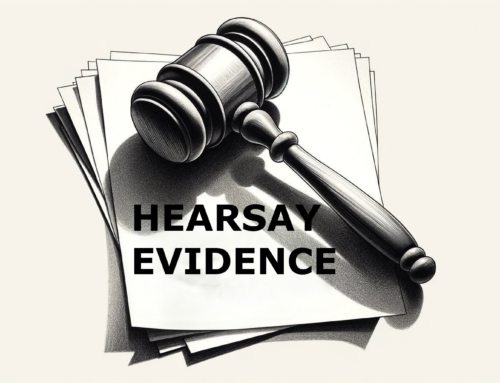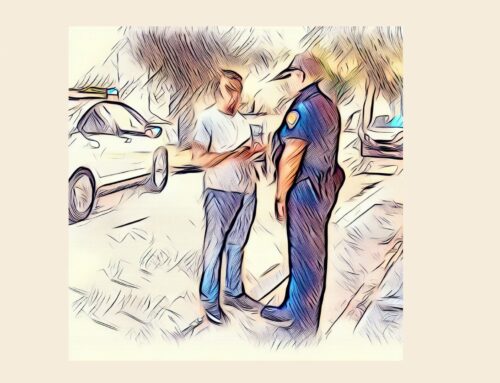Circumstantial Evidence in Criminal Defense Cases
When it comes to criminal defense, one term you may have heard thrown around is “circumstantial evidence.” In this post, we’ll break down circumstantial evidence, how it differs from direct evidence, and its role in criminal cases. We’ll also provide examples and discuss how it can impact a trial. Whether you’re simply curious about legal terms or facing a criminal case, this post will provide valuable insights into the world of circumstantial evidence.
What is Circumstantial Evidence?
Circumstantial evidence is a type of evidence that indirectly points to a fact rather than directly proving it. Unlike direct evidence, which provides a clear and definitive link between an alleged crime and the defendant, circumstantial evidence requires jurors to make reasonable inferences to arrive at a conclusion. In a criminal defense case, using circumstantial evidence can be crucial in establishing reasonable doubt, which is necessary for the defendant to avoid conviction.
Circumstantial Evidence Definition
According to a legal dictionary, circumstantial evidence can be defined as “evidence that relies on an inference to connect it to a conclusion of fact, like a fingerprint at the scene of a crime.” This means that circumstantial evidence does not directly prove guilt or innocence but rather allows jurors to draw reasonable conclusions based on the proven facts presented during the trial.
Circumstantial Evidence Examples
Common examples of circumstantial evidence in criminal cases include:
- DNA evidence found at the crime scene
- Physical evidence, such as a weapon with the defendant’s fingerprints
- Eyewitness testimony placing the defendant near the scene of the crime
While circumstantial evidence can be persuasive, it is not always enough to prove guilt beyond a reasonable doubt.
Circumstantial Evidence vs. Direct Evidence
While circumstantial evidence requires jurors to make inferences, direct evidence provides a clear and definitive link between the defendant and the alleged crime. Direct evidence can include witness testimony, video footage, or other direct proof that clearly establishes a connection between the defendant and the crime.
In a criminal case, both direct and indirect evidence can be used to establish guilt or innocence. However, a strong circumstantial case may still raise reasonable doubt, which can be enough to prevent a conviction.
Direct Evidence Examples
Examples of direct evidence in criminal cases include:
- Eyewitness testimony directly implicating the defendant in the crime
- Video surveillance footage showing the defendant committing the crime
- Confessions or admissions of guilt by the defendant
The Role of Circumstantial Evidence in Criminal Defense
In criminal defense cases, circumstantial evidence can be a double-edged sword. On one hand, it can create reasonable doubt in the minds of jurors, potentially leading to a not-guilty verdict. On the other hand, if the circumstantial evidence is strong and compelling, it may persuade jurors to convict the defendant.
A skilled criminal defense lawyer will carefully analyze the circumstantial evidence in a case to determine how it can be used to their client’s advantage. This may involve challenging the credibility of witnesses, questioning the reliability of forensic evidence, or presenting alternative explanations for the circumstantial evidence.
Reasonable Doubt and Circumstantial Evidence
In a criminal trial, the prosecution must prove the defendant’s guilt beyond a reasonable doubt. Circumstantial evidence, when presented effectively, can create doubt in the minds of jurors, making it difficult for the prosecution to meet this burden of proof. As a result, circumstantial evidence can play a critical role in establishing reasonable doubt and securing a favorable outcome for the defendant.
Circumstantial evidence, though not as straightforward as direct evidence, can still play a crucial role in criminal defense cases. Understanding the difference between direct and circumstantial evidence is essential for anyone involved in a criminal case, as it can impact the outcome of a trial.
In some instances, circumstantial evidence may be enough to create reasonable doubt, ultimately leading to a not-guilty verdict. However, it’s important to remember that each case is unique, and the strength of the circumstantial evidence may vary. Working with a skilled criminal defense lawyer who can analyze the evidence and craft a strong defense strategy tailored to your specific situation is essential.
Contact Us About Your Criminal Case
Remember, seeking legal advice from an experienced law office is crucial if you’re facing a criminal case. Many attorneys offer free case evaluations, so don’t hesitate to reach out and explore your options. The right attorney-client relationship can provide the guidance and support you need to defend yourself effectively.
As a defendant, staying informed and educated about your case is critical. Whether it’s familiarizing yourself with legal terms such as “circumstantial evidence instruction” or understanding the nuances of appellate court opinions, staying knowledgeable about the process can empower you to make informed decisions.
Circumstantial evidence plays a vital role in criminal defense cases, and understanding its nuances is vital for anyone facing a trial. With the right legal representation and a strong understanding of the evidence, defendants have a better chance of achieving a favorable outcome.
CALL US for a FREE CONFIDENTIAL CONSULTATION at (305) 538-4545, or take a moment to fill out our secure intake form. *The additional information you provide will greatly assist us in responding to your inquiry.
*Due to the large number of people who contact our law office requesting our assistance, it is strongly suggested that you take the time to provide us with specific details regarding your case by filling out our confidential and secure intake form. The additional details you provide will greatly assist us in responding to your inquiry promptly and appropriately.
ALWAYS INVESTIGATE A CRIMINAL DEFENSE ATTORNEY’S QUALIFICATIONS AND EXPERIENCE BEFORE MAKING A DECISION ON HIRING A LAWYER FOR YOUR CRIMINAL CASE IN MIAMI-DADE COUNTY









